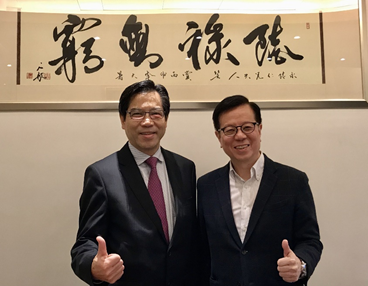
~~~~~~~~~~~~~~~~~~~~~~~~~~~~~~~~~~~~~~~~~~~~~~~~~~~~~~~~~~~~~~~~
Source:
| 2020-01-16 | Eastweek magazine | The Knowledge of Accounts Receivable Management
~~~~~~~~~~~~~~~~~~~~~~~~~~~~~~~~~~~~~~~~~~~~~~~~~~~~~~~~~~~~~~~~
Host: Chan Wing-luk
Guest: Ken Wong (Chairman & Co-Founder of BIBO Limited)
I love interviewing senior management from various industries because they allow me to gain insights from different fields and industries. Scenes of debt collectors in movies often portray them as people with horrific and dreadful attitude, who might even vandalise debtors’ homes with graffiti demanding them to “pay off your debt”. Is this purely fictional, or is this art imitating life? Recently, I interviewed Ken Wong, co-founder of accounts receivable management firm BIBO. His first response was that such scenes have led to many people’s misunderstanding of their industry. Ken explained that the industry has been evolving and improving with the times. Debt collection does not work and is not effective by “making threats”. Instead, it relies on compliance, empathy, and privacy protection. It also utilises technology and big data analysis, and is a scientific operation.
BIBO was established in 2000 by Ken and two of his friends, and the firm specialises in accounts receivable management and professional debt collection services for clients. Ken had started his career at a bank, upon graduation from the Chinese University of Hong Kong’s Department of Economics. He spent over ten years working in banks, where he amassed a wealth of knowledge on the financial industry. He opined that all banks and financial institutions have the need for handling accounts receivable, and yet they do not always have the manpower to handle them internally. Often, this function is outsourced, to better utilise resources, and to also improve the efficiency of collection. Banks emphasized compliance. As such, BIBO’s direction is to set a new operational standard for the industry: debt collection in a compliant approach. BIBO began its business with banks as its clients, but gradually came to realize that all businesses that provides services or deliver a transaction before collecting payment would require accounts receivable service, and so it began to expand its clientele to other industries. I joked that if I had an outstanding debt to collect, would a debt collection company take on my request? Ken gave a quick-witted answer: as long as it is not a debt arising from a mahjong game, his company would consider.
On the importance of compliance, Ken thinks that as accounts receivable management is a service instead of a tangible product that a client could try out, it may be difficult for clients to determine a firm’s service quality. When the firm contacts a debtor on behalf of itsr client, every single action they make has a direct impact on the client’s reputation. Hence, service quality is not just an option, but a necessity. BIBO has established a compliance system and exercises stringent monitoring, guiding its staff to handle over 1.7 million cases in the past 20 years, involving almost 500,000 parties, and thereby building the company’s reputation in the industry. BIBO emphasizes compliance, with its operations being guided by four major pillars: relevant laws, industry and regulatory rules, rules from clients, as well as its inhouse policies.
As the middleman between its clients and their debtors, BIBO has to understand each case well to balance the perspectives and interests of both parties, provide its recommendations based on facts, and assist both parties to reach an agreement. To enhance the company’s professional standards, quite a number of its staff are qualified mediators, and the company also supports staff to undergo training courses to become accredited.
Traditional accounts receivable services are generally labour-intensive, but BIBO utilises artificial intelligence (AI) in its case analysis, allowing it to calculate the success rate of collection. With such a model, the firm can prioritise its tasks and optimise its scheduling, and assign tasks based on an employee’s skill set and experience, thereby greatly enhancing efficiency. At the same time, the company uses an intelligent automated dialling system to make calls. This allows protection on the debtor’s personal information and safeguards privacy. The system shows dialogue summaries to facilitate handling and follow-up.
I was impressed by Ken’s shrewdness in accounts receivable management. Out of curiosity, I asked if he would consider purchasing receivables. He said they have already established a separate company for this purpose. Debt purchase is not solely for profit-making, but is also a means to help the clients with a faster cash return. It is a win-win situation for both the company and its clients.
(The original article was written in Chinese. In case of any discrepancy
between the English version and the Chinese version, the Chinese version shall prevail.)
